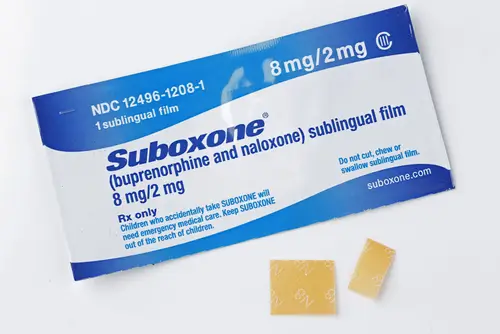In recent years, the question of whether someone can overdose on Suboxone has become increasingly significant. Suboxone, often considered a remedy in the battle against opioid addiction, carries its own potential benefits and dangers.
When talking about Suboxone, it is vital to approach it with a balanced perspective. You must explore both the efficacies and the associated risks of this treatment. Before deciding if Suboxone is right for you – explore what it is, how it helps with addiction, and the dangers associated with this treatment.

What is Suboxone?
Suboxone is a branded prescription medication containing a combination of buprenorphine and naloxone. These ingredients play distinct roles: buprenorphine, a partial opioid agonist, provides a reduced opioid effect to curb withdrawal symptoms, and naloxone, an opioid antagonist, seeks to reverse the effects of opioids in the body.
- Development and Approval: The FDA approved Suboxone in the early 2000s, and it quickly became an important tool in the fight against opioid addiction. It came onto the market as a product that offered a safer and more controllable alternative to methadone. Methadone is a full opioid agonist used in medication-assisted treatment (MAT).
- Chemical Composition and Action: Understanding the chemical composition of Suboxone helps to grasp how it functions and the associated risks. The two main components are buprenorphine, which offers some relief from withdrawal symptoms by activating the opioid receptors partially, and naloxone, which counters opioid effects, preventing potential misuse and offering a safety net against overdose.
What is Suboxone Used For?
Suboxone has been found to help medically in two significant areas. Exploring its use in these areas can explain why it’s important in medical treatment today.
- Opioid Use Disorder Treatment: Suboxone is used in medication-assisted treatment (MAT) programs for individuals struggling with opioid dependency. Easing withdrawal symptoms and reducing cravings helps facilitate the transition away from more hazardous opioids and serves as a cornerstone in recovery journeys.
- Pain Management: Besides addiction recovery, Suboxone can sometimes accompany some pain management regimens, especially for individuals with a history of opioid dependence. Though not its primary use, it offers a reduced risk for addressing chronic pain issues.
Read more: What Is MAT And How Does It Work?

How Overdose Occurs?
Despite its ability to aid in recovery from addiction, Suboxone comes with significant risks, including the possibility of overdose, either through exceeding the recommended dose or mixing it with other substances.
- Symptoms of Overdose: Recognizing the symptoms of a Suboxone overdose can potentially save lives. Symptoms often include severe drowsiness, respiratory distress, impaired coordination, and loss of consciousness. Individuals may also exhibit pinpoint pupils and reduced responsiveness.
- Risk Factors and Interactions: Individuals with a history of substance abuse or those combining Suboxone with other central nervous system depressants, such as alcohol or benzodiazepines, are at a higher risk of overdose.
How to Properly Use Suboxone
Adhering to prescriber guidelines and maintaining open communication with your Suboxone prescriber is important in the successful use of Suboxone. Following the guidelines and being truthful is imperative to stop a potential overdose.
- Adhering to Medical Advice: Taking Suboxone as prescribed, which includes respecting the dosage and frequency recommended by the healthcare provider, is crucial for safe use. Modifying the regimen in any way, such as crushing or dissolving it, should be avoided to prevent adverse effects.
- Regular Medical Follow-Up: Regular consultations with healthcare providers are required with Suboxone use. It can help track the progress and make necessary adjustments to your treatment plan. This enhances the safety and effectiveness of the treatment.
- Awareness and Education: Understanding Suboxone, its effects, and potential side effects can be empowering. Individuals under treatment should be encouraged to learn about their medication. Educating yourself fosters responsible use and the ability to identify signs of an overdose.
Read more: The Dangers & Treatment Of A Suboxone Addiction

Seeking Help with Suboxone
Suboxone presents a hopeful pathway out of opioid addiction, but it is not without its own associated risks. Recognizing these attributes allows you to ensure your recovery by adding other treatments to your journey to an addiction-free life.
- Individualized Treatment: Starting an individualized treatment plan encompassing therapy, educational components, and a structured routine aims to equip individuals with the skills needed for long-term recovery.
- Building Support Networks: Recovery is a journey no one needs to take alone. A support system with group therapy, aftercare programs, and case management can help individuals feel connected and strengthened.
Launch Centers is Here to Help You with Suboxone Use
The journey to recovery can feel overwhelming – it is intricate and laden with challenges. It also offers the promise of a brighter future. By fully understanding Suboxone and its role in this journey, you empower yourself to be successful. If you or a loved one find yourselves navigating this path, reach out to Launch Centers for guidance, support, and the tools necessary for recovery.
Call us today if you have an addiction requiring Suboxone use or fear that you might end up overdosing due to misunderstanding your treatment. Launch Centers offers a holistic approach emphasizing safe and informed Suboxone use for a long-term recovery solution.





